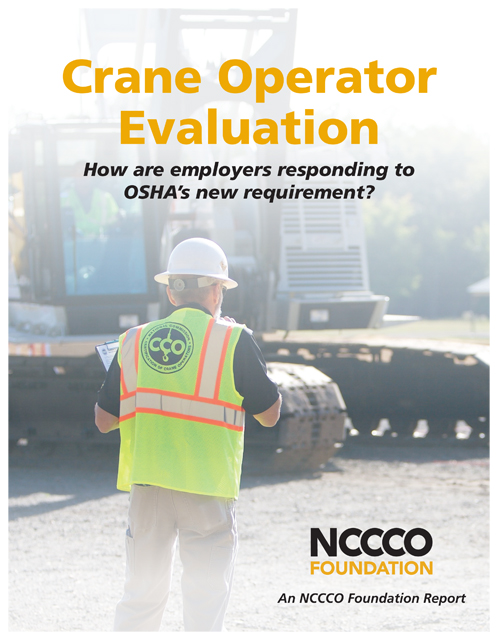
Most employers have a fairly sound understanding of their duties and responsibilities to evaluate their crane operators, a new report published by the NCCCO Foundation suggests. But there are some aspects of the OSHA crane operator qualification rule that give rise to a degree of confusion and misunderstanding.
The Report, Crane Operator Evaluation: How are Employers Responding to OSHA’s New Requirement?, is the result of a study undertaken by the NCCCO Foundation. It sought to assess the degree of understanding and compliance by employers of crane operators with OSHA’s revised crane operator qualification rule published in November 2018 and, in particular, with what has become known as the “third step” of that qualification process, namely, the evaluation of crane operators.
Employers were polled as to their level of understanding and/or compliance with each of the key elements of the new evaluation requirement. They were also asked several open-ended questions to gauge any general concerns or challenges.
“Overall,” said NCCCO Foundation CEO Graham Brent, “the findings are quite encouraging. Most employers that completed the survey were aware of the key elements of the evaluation requirement and how it works together with training and certification to complete the qualification process.
“In fact, many already had a process in place that simply needed to be reviewed in light of the new rule.”
Results were less strong when employers were asked to identify events that would trigger new evaluations, as well as the criteria they used to qualify evaluators. While some had a negative view of the requirement, Brent said (a third found it “burdensome”), fully 61 percent believed it would “help to save lives.”
Publication of the Report was timely, said Brent, in light of the imminent release of OSHA’s Compliance Directive on the crane rule that would doubtless provide employers with a clearer understanding of the Agency’s intent and compliance focus.
In addition to the results of the survey, the twenty-page Report includes a three-page FAQ section on OSHA’s crane operator evaluation requirements, as well as links to additional resources, supplementary findings, and the survey itself. Employers who have not yet done so are invited to complete the survey and return it. Multiple excerpts from the rule and its preamble, highlighting not only key provisions of the requirements but also the rationale OSHA employed for developing them, support the text throughout.
Crane Operator Evaluation: How are Employers Responding to OSHA’s New Requirement? is available for free download from the NCCCO Foundation Web site at www.ncccofoundation.org.










